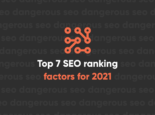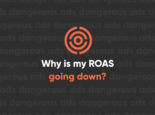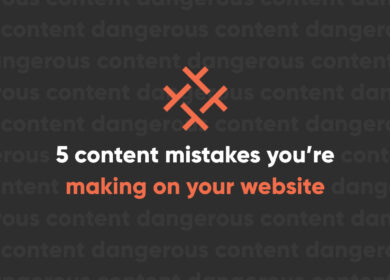
5 SEO tactics that simply aren’t worth it in 2021
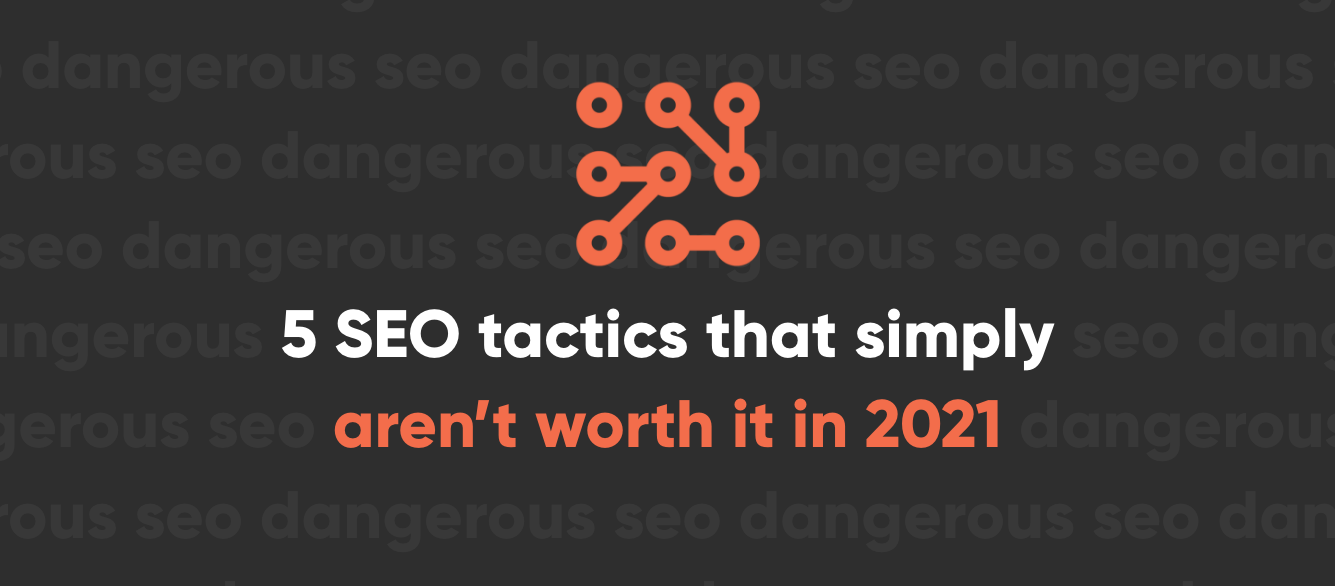
An SEO specialist’s day is often jam-packed with meaningful, worthwhile tasks. Fixing broken links. Optimizing title tags and meta descriptions. Convincing clients that what you’re doing is not some form of arcane sorcery.
In fact, they’re some of the busiest people I know. If that sounds like you, then all the more reason to take a few time-sucking tactics off your plate for good.
Whether they’re extremely risky, outdated, or far too time-consuming, these are the top five SEO strategies that simply aren’t worth your effort.
1. Negative SEO
First things first—what is negative SEO?
No, it doesn’t mean “providing search engine optimization services with an overly sour attitude.”
Negative SEO is generally understood as any malicious act aimed at sabotaging a competitor’s search rankings.
These “black hat” practices can take many different forms, including:
- Generating hundreds of toxic backlinks
- Posting dozens of fake negative reviews
- Sending counterfeit backlink removal requests
- Duplicating your site’s content across the internet so it gets flagged
- Kicking in the door and burning down your house (a.k.a. hacking your site and having their way with it)
Can these types of shady strategies work? Yes, of course, but not nearly as well as they used to. Google has gotten quite good at stamping down on these sorts of scams.
Let your competitors waste their time on these dirty tricks while you help your clients get ahead the good old-fashioned way—fair and square.
2. Buying multiple domains
Think of the internet as a vast desert, with each grain of sand being a unique domain. While plenty of URLs have been taken by this point, there is a nearly infinite amount still available, many of which will cost you roughly the equivalent of a bag of sand.
One particular grey hat strategy that has seen some limited success is the purchase of new or expired domains for the sake of adding to your link profile. SEO specialists can identify and buy dozens—if not hundreds—of URLs in the niche of their choosing, and either build backlinks to their main site or 301 redirect traffic altogether.
Seems too good to be true, right? Well, yes. Sort of.
Brand-new domains are seldom going to be worth your time unless you happen to stumble upon a diamond in the rough, also known as a domain that is already getting high organic search volume. You should also avoid building additional domains up from nothing, because you'll be tempted to duplicate your main site's content, and that is always a big no-no.
Purchasing recently expired domains can be worthwhile, but it does come with a lot of risks. First, it needs to be related content. If you're operating a car insurance website and linking from your newly acquired pet food site, that's not good. Not only is it going to be sending over entirely unqualified traffic, but eventually Google is going to see through your little mirage.
If it's a former competitor's site with pages that are still actively ranking, it may be worth the purchase, but only if you do your research first. Check the history of their backlink profile to see if there are any questionable or nefarious links lingering in their closet. Once you redirect that domain to your site, you're assuming all risk of skeletons.
3. Social bookmarking
Okay, you might be asking yourself, what is social bookmarking?
That’s a great question because truth be told, I only learned of the term somewhat recently.
Social bookmarking is, according to HubSpot:
“…the process of saving a specific web page to a social bookmarking platform so you can revisit it later. Social bookmarking sites allow users to access their bookmarks online, at any time, from any device. Social bookmarking sites are useful to marketers because users can add, annotate, and share bookmarked web pages with their team.”
If you read that description and thought to yourself – “How could I possibly use this harmless tool to growth hack my SEO efforts?”– then you’re truly one of the good ones.
The idea is that you sign up for a social bookmarking site or two, such as SocialADR or scoop.it, and pay to essentially automate social shares of your website’s content. No need to reach out to a real human being whatsoever.
What’s the catch?
It really doesn’t work. At least not anymore.
This is a fairly used-up SEO strategy, and Google has a ton of practice in identifying these social bookmarking sites and ignoring the spammy links they produce.
You will be much better off spending your time fostering genuine relationships with industry authorities and social influencers in your niche.
A hard-earned backlink from someone like that will not only make you so happy that you do a stupid little dance at your desk, it also will bring you better results almost every time.
4. Purchasing backlinks
This one is so similar to social bookmarking that I almost didn’t include it. However, when I realized how many people were still plunking down hard-earned dollars for links—even though this tactic has violated Google’s webmaster guidelines for what seems like an eternity now—I knew it had to make the cut.
It doesn’t even matter if you buy one link or 100,000, eventually, you’re going to get caught and penalized.
How am I so confident?
Because it’s really, really easy for Google to do. All it takes is one weak link (pardon the pun) to crack down on the entire chain.
Let’s say one day they notice an unnatural pattern of inbound links on a particular site. All they have to do is look to where those links are coming from to identify the seller. From there, they can track down every other buyer from that site, and so on and so forth.
While you could get away with buying just one high-quality backlink, you do run the risk of that link getting removed and now you just wasted a lot of money on one egg in one basket. Do it too much though, and Google will start to penalize you. It can start with a slight reduction in PageRank, but if you refuse to learn your lesson, can quickly escalate to your entire site being de-indexed.
You really don’t want that.
Here are six far less risky ways to grow your link profile. Try literally any one of those before you buy any links.
5. Guest blogging
Okay, so I’m well aware that this one is going to be a bit controversial. The thing is, guest blogging can be a really good SEO strategy if it's done in the right way and for the right reasons. The problem is, the vast majority of the time, it isn't and it isn't.
I'm going to take a quick step back and define guest blogging, for those who don't know. Guest blogging is the act of writing content to be published on another site, typically one that is more highly trafficked than your own. The idea, in essence, is that you are broadening your reach by putting your name and brand out there for more people to take notice.
Fortunately, there is—and likely always will be—a place for multi-author articles and high-quality guest blogs. If you want to reach out to a reputable publication in your niche so that you can share important information with a wider audience who will hopefully visit your site after they read the article, I say go for it.
If your primary goal is to get those golden links regardless of the content or the industry of the site you're writing for, you’re better off finding another way.
Nine times out of ten, it won’t be worth your time.
BONUS: Keyword stuffing
Don’t use keyword stuffing. Keyword stuffing is bad. SEO specialists used to use keyword stuffing (and super popular variations like keyword planting, keyword jamming, search query packing, keyword crushing, keyword overwhelming, and keyword drubbing) all the time because the Google algorithm liked keyword stuffing and rewarded the keyword stuffing SEOs for all their keyword stuffing hard work.
Luckily for us content consumers, keyword stuffing is no longer effective. Google’s algorithm is now smart enough to know keyword stuffing when it sees it. Stop keyword stuffing.
Seriously. Do as I say, not as I keyword stuff.
Okay, so what SEO tactics are worth it?
Answer: Hiring an experienced SEO partner that can help get you the results you desire.
On a scale of 1–10, how much do you trust your current SEO agency to NOT employ any of the above tactics? If your answer is anything less than a 10, you may want to consider making a change.
As Minneapolis’ first digital-focused agency, we’ve seen more than our fair share of these scammy SEO tactics come and go. If you think it’s a coincidence that we’re still in the game after nearly 30 years, you can think again.
We refuse to fall for the “shortcut of the week” and pride ourselves on employing only the most sustainable, white hat strategies to help our clients win online.
Want to join us at the top? Contact us today to discuss an SEO strategy worthy of your brand.

Greg Johnson
Author
Greg Johnson
Categories
Date
Explore with AI
Join Our Newsletter

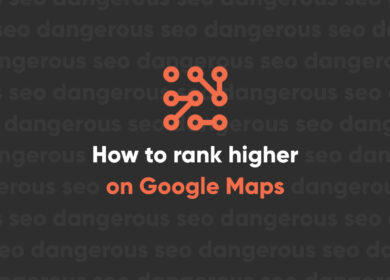
Where’s my business? How to rank higher on Google Maps

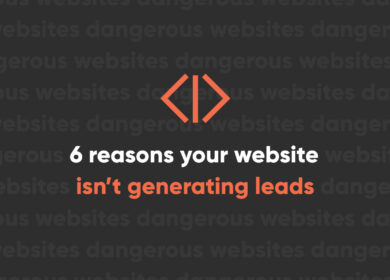
6 reasons your website isn’t generating leads

